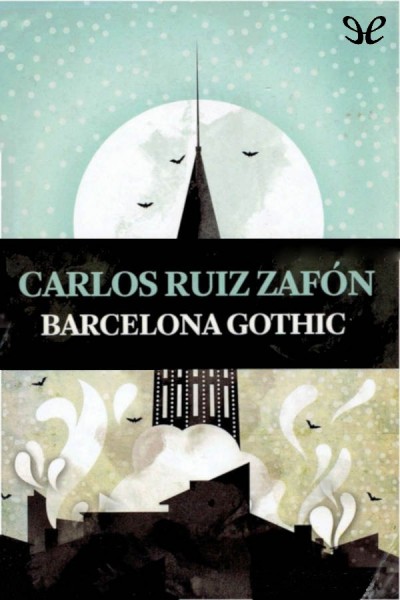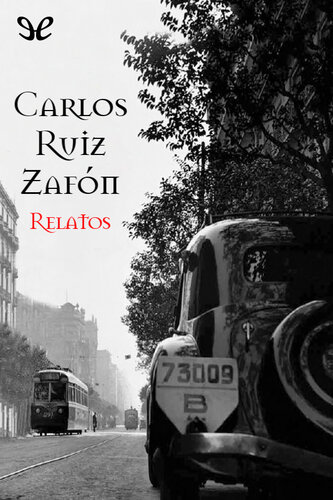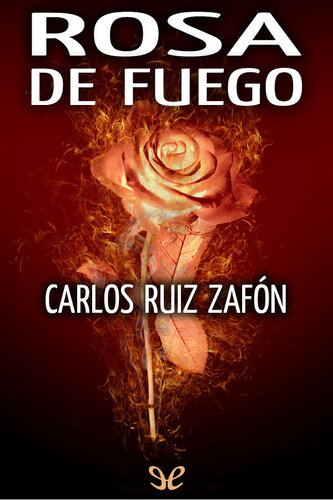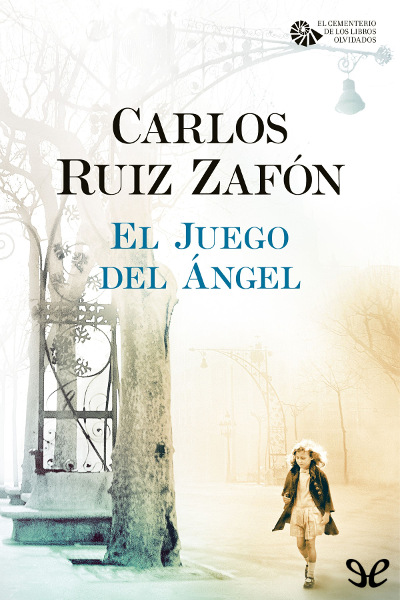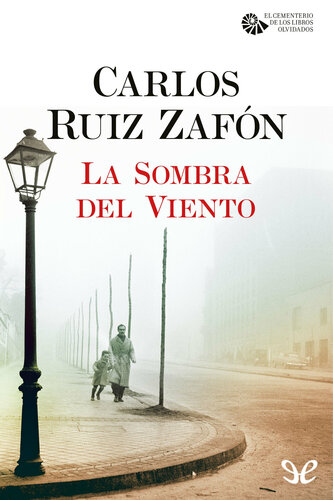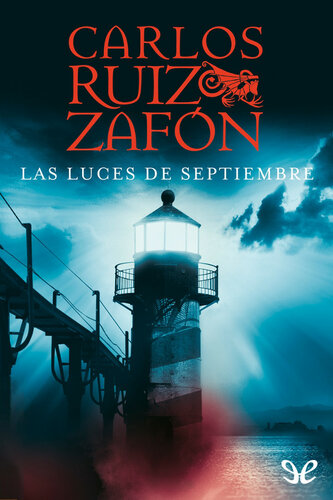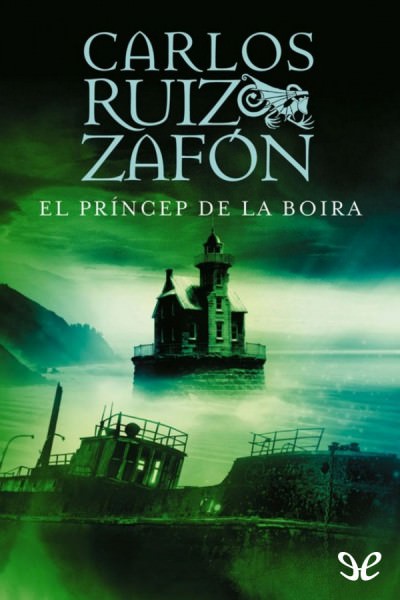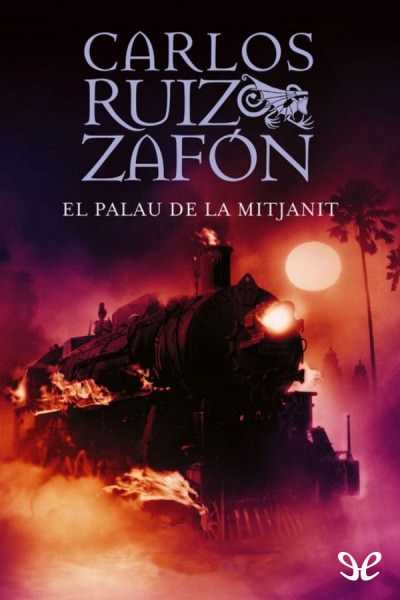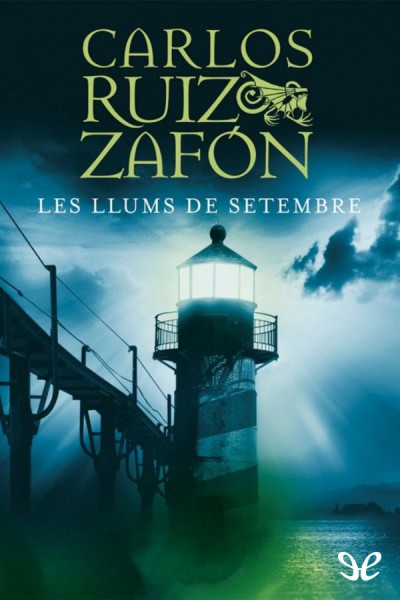oleebook.com
LOmbra del Vent de Carlos Ruiz Zafón
de Carlos Ruiz Zafón - Género: Intriga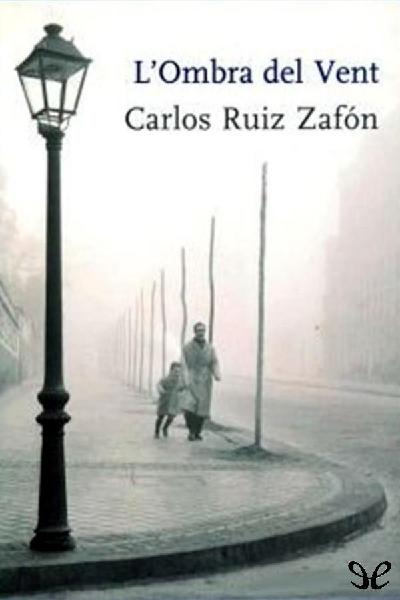
Sinopsis
Una matinada de 1945 un noi és acompanyat pel seu pare a un indret misteriós amagat al cor de Ciutat Vella: El Cementiri dels Llibres Oblidats. Daniel Sempere hi troba un llibre maleït que canvia el rumb de la seva vida i larrossega a un laberint dintrigues i secrets enterrats a lànima fosca de la ciutat. LOmbra del Vent és un misteri literari ambientat a la Barcelona de la primera meitat del segle XX, des dels últims esplendors del Modernisme a les tenebres de la Postguerra.
Combinant les tècniques del relat dintriga i suspens, la novel·la històrica i la comèdia de costums, LOmbra del Vent és sobretot una tràgica història damor el ressò de la qual es projecta a través del temps. Amb gran força narrativa, lautor entrellaça trames i enigmes a manera de nines russes en un inoblidable relat sobre els secrets del cor i lembruix dels llibres, lintriga dels quals es manté fins a lúltima pàgina.
Descargar
Descargar LOmbra del Vent ePub GratisLibros Recomendados - Relacionados
Reseñas Varias sobre este libro
I read the opening few pages and instantly knew 3 things:
1. I was going to love this book.
2. I needed a whole pad of post-its to mark quotes.
3. I wanted to read this in Spanish for the rich poetry the language would add.
A young boy Daniel is taken by his father to the Cemetery of Forgotten Books and told to salvage a book which he must take stewardship over. He choses a novelor maybe it chose himthat touches him, stirs his desire for literature, and forever entangles him with the fate of the book and its author. The strange author died in poverty but now someone is seeking out all remaining copies of his unsuccessful novels to burn. Daniel embarks on a mission to solve the mystery of the author's story being watched by a revengeful cop and the book burner himself. As the story twists and slowly unravels he doesn't know whose account to trust or how it will affect his life.
Wrapped up in the mystery is a message of death: do we live a full life or wander through it numb? The Shadow of the Wind is an allegory for death in a fictitious novel by the same title. Shadow is a perfect symbol for death evoking images of how death can be metaphorical instead of literalliving shadows of lives, chasing shadows of dreams, being shadows of others, letting memories shadow life. Every character had shadows which could engulf them or they could overcome. In this sense death becomes a fate we chose ourselves. For death is not always the worst thing that can happen ("words are not always the worst prison"). Every time the word shadow was used I considered its illusion of death. It was with much thought that the word was scattered throughout the book.
Spoilers
Just as the fictitious novel was an echo of the book and Julian's life, I loved watching Daniel's life parallel Julian's. Both grew up poor without an ideal family life, fell in love with a rich girl who was the adoration of her father and whose brother was a best friend, evoked murderous anger from her father after impregnating her, and when they have a brush with death, extremes of hate and love anchored their fight to survive. As Julian's story unfolds, Daniel unwittingly finds himself in the exact same point of their duel destiny.
Once Daniel is aware of the correlation, the comparison stops. Is it because Daniel consciously chooses to chance his path or has fate dealt him a better hand? Julian wrote "There are no coincidences. We are the puppets of our subconscious desires." But while the message is clear that we chose our own fate, it seems there was no fate but failure for Julian. The sad thing is I believed Julian's love for Penelope as it grew in obsession more than Daniel's love for Beatriz which seemed a happy chance of lust.
Themes of devils and angels are prevalent as characters save and ruin each others' lives. Clara is a physical angel who is blind while Fumero an emotional devil blinded by hate. While women tended to be described as angel and men devil, most characters held both in different shades. Take Julian the angel child bringing life (love, novels) who turned into the devil Lain Coubert bringing death (destruction, fear). But the characters pick whether to accept the destiny allotted them. Fermin was living death in the shadows of the street who had to get over his demons to find life worth living. The shadows for Nuria, Julian, Fortuny, even Fumero didn't have to give them a reason to quit living. They chose shadows.
The book reminded me of The 13th Tale thematically, linguistically, and in delivery, although I loved this book so much more. The way the mystery unfolds finding tidbits from different perspectives enhanced the mystery and aided the depth of characterization. When I can see the vicious wife beater, deceived husband, and regretful father all in Antonio Fortuny I get a more well rounded sense of his motives. I enjoyed how the characters played different roles for each other.
I love Barcelona as the setting. If you've been to the artistically enchanting city, you know it's the perfect backdrop to this eloquently enchanting tale with a gothic feel. The Spanish have a way of making all things metaphorically beautiful. The vivid romantic passages had me smiling and at times laughing out loud. I highly enjoyed the writing and it wasn't until two-thirds of the way into the book that the story finally stole my complete attention. Julian was my initial guess and while the story kept me questioning, it was the best solution and I was happy with the conclusion.
But no novel is perfect; my issues are these:
1. The readymade quotes are extreme. Zafon salvages this by calling himself out on the commentary. He sets the comments up in dialogue and then uses another character to mock the snippets.
2. Perspective, particularly in Nuria's letter, is off. How could she know what Miquel looked at when dying? The chapters of her letters change from direct commentary to Daniel to third-party narrative. Elsewhere in the novel Daniel summarizes conversations in italics but I wondered from whence the interruption of her narrative with Fumero's story came.
3. I always hope historical fiction will showcase a more accurate moral setting, but it rarely happens. While I believed the sex about Zafon's characters, done in secret and with fathers chasing down the culprits, how could they find out they were pregnant the next day? I was also disappointed that all marriages were displayed as wrong and wives disregarded. Oh well. I guess it added to the Spanish flavor of the book.
4. American authors tend to impose unrealistic happy endings while Europeans favor poignant sad ones. At one point it seemed bad things happened to Julian for nothing else than this love of tragedies. It seemed Zafon was going to ruin the characters lives to make a point. But he makes his point with Julian and leaves Daniel to gives us a satisfied ending. A story about the living dead cannot be all bliss but we still find redemption as the characters step out of the shadows and live their lives.
Quotes:
Few things leave a deeper mark on a reader than the first book that finds its way into his heart.
I believed, with the innocence of those who can still count their age on their fingers, that if I closed my eyes and spoke to her, she would be able to hear me wherever I was.
A secret's worth depends on the people form whom it must be kept.
Women have an infallible instinct for knowing when a man has fallen madly in love with them, especially when the male in question is both a complete dunce and a minor.
Death was a nameless and incomprehensible hand... a hellish lottery ticket. But I couldn't absorb the idea that death could actually walk by my side, with a human face and a heart that was poisoned with hatred.
The eternal stupidity of pursuing those who hurt us the most.
Paris is the only city in the world where starving to death is still considered an art.
Arrogant as only idiots can be.
I felt myself surrounded by millions of abandoned pages, by worlds and souls without an owner sinking in an ocean of darkness, while the world that throbbed outside the library seemed to be losing its memory.
Presents are made for the pleasure of who gives them, not for the merits of who receives them.
Television...is the Antichrist...our world will not die as a result of the bomb...it will die of laughter, of banality, of making a joke of everything.
I realized how easily you can lose all animosity toward someone you've deemed your enemy as soon as that person stops behaving as such.
People talk too much. Humans aren't descended from monkeys. They come for parrots.
God, in His infinite wisdom, and perhaps overwhelmed by the avalanche of requests from so many tormented souls, did not answer.
Silencing their hearts and their souls to the point where...they forgot the words with which to express their real feelings.
People are evil. Not evil, moronic, which isn't quite the same thing. Evil presupposes a moral decision.
The words with which a child's heart is poisoned, through malice or through ignorance, remain branded in his memory, and sooner or later they burn his soul.
Marriage and family are only what we make of them.
Sometimes what matters isn't what one gives but what one gives up.
Destiny is usually just around the corner. But what destiny does not do home visits. You have to go for it.
Just an innocent boy who thought he had conquered the world in an hour but didn't yet realize that he could lose it again in an instant.
Keep your dreams. You never know when you might need them.
Fools talk, cowards are silent, wise men listen.
Waiting is the rust of the soul.
Sometimes we think people are lottery tickets, that they're there to make our most absurd dreams come true.
While you're working you don't have to look life in the eye.
Most of us have the good or bad fortune of seeing our livs fall apart so slowly we barely notice.
Time goes faster the more hollow it is.
I learned to confuse routine with normality.
The world war, which had polluted the entire globe with a stench of corpses that would never go away.
The clear, unequivocal lucidity of madmen who have escaped the hypocrisy of having to abide by a reality that makes no sense.
A story is a letter the author writes to himself to tell himself things he would be unable to discover otherwise.
The art of reading is slowly dying, that it's an intimate ritual, that a book is a mirror that offers us only what we carry inside us, that when we read, we do it with all our heart and mind, and great readers are becoming more scarce by the day.
[speaking of television:] The novel is dead and buried...there'll be no more need for books, or churches, or anything.book-club favorites historical-fiction ...more1,547 s Petrik735 52.2k
4.5/5 stars
An astonishingly engaging story within a story type of novel; the passion for books and reading introduced in the first chapter was just an appetizer before all the interconnecting twists and turns.
Ive been having a lot of good lucks lately in reading books outside of epic fantasymy favorite sub-genre. The Shadow of the Wind is a novel that Ive heard so many positive things about for several years; it is one of those books thats often recommended by readers, regardless of their main preferences sub-genre of reading. And now that Ive read it, I can understand why it received all the critical acclaims. Sheer brilliance in storytelling and writing aside, The Shadow of the Wind is a book about books, a story about a story, and it would be difficult for readerswho obviously love booksof all kind of genre to resist the charm in the narrative. Im going backward here because The Shadow of the Wind was published first, but if youve read and loved The Ten Thousand Doors of January by Alix E. Harrow, I think youre going to love this novel as well. These two books have many similarities in themes and their approaches to the passion for books and its mystery + coming-of-age centered plotlines.
In the shop we buy and sell them, but in truth books have no owner. Every book you see here has been somebodys best friend.
The Shadow of the Wind is the first book in The Cemetery of Forgotten Books quartet by Carlos Ruiz Zafón. The story takes place in Barcelona, 1945, and heres the short premise of the novel. On his eleventh birthday, Daniel Sempere wakes up and finds out that he cannot remember the face of his mother anymore. To cheer him up, Daniels father takes him to the secret of the Cemetery of Forgotten Books, a library that holds the books forgotten by the world, just sitting there waiting for the right reader to choose a book that will hold a special meaning to them. Daniel selects a book titled The Shadow of the Wind by Julian Carax, and he falls in love with it immensely, then he seeks other books written by Julian only to find out that someone has been destroying every book written by the author. He may just be holding the last copy of the authors work, and hes trying to solve the mystery behind this bizarre incident.
Every book, every volume you see here, has a soul. The soul of the person who wrote it and of those who read it and lived and dreamed with it. Every time a book changes hands, every time someone runs his eyes down its pages, its spirit grows and strengthens.
As I mentioned, The Shadow of the Wind is a story within a story. It tells a coming-of-age story of Daniel Sempere as he tries to unravel the mystery behind Julian Carax and the disappearances of his novels. Despite this novel has been published for more than a decadealmost two decades in its original languagenow, I somehow was able to approach this book knowing close to nothing; I plan to keep it that way for future readers who stumbles upon this review. Let me, however, say that Im pleasantly surprised by how much I grew to care about the characters in this novel, especially for Daniel and FerminFermin is hands down my favorite character of the book. Daniels story and the secrets he unravels continuously gripped me, Fermins personality plus his dialogues are so intoxicating, and most of all the friendship these two nurtured is incredibly heartwarming.
One of the pitfalls of childhood is that one doesn't have to understand something to feel it. By the time the mind is able to comprehend what has happened, the wounds of the heart are already too deep.
I havent been to Barcelona, what I know of it, I see, learn, and heard from other people and other media. However, theres a super atmospheric quality thats so immersive to Zafóns writing; when I was reading the book, it feels I was truly there. Im in a similar situation with my friends, in that I havent read the book in its original language, and because of this, I cant gauge the accuracy of the translations. But as far as reading the book in English goes, the translation done by Lucia Graves flows absolutely well. There were a few flashback sections where I found the book to be slightly uneven in its pacing, but for the majority of the novel, Zafóns prose and Graves translations were extraordinarily compelling and accessible. Im serious; I lost count on how many passages I highlighted because they were so well-written and relatable to me.
Bea says that the art of reading is slowly dying, that it's an intimate ritual, that a book is a mirror that offers us only what we already carry inside us, that when we read, we do it with all our heart and mind, and great readers are becoming more scarce by the day.
Picture: The Shadow of the Wind by Vincent Chong
Theres simply no scarcity of insightful and wise remarks within this novel that brims with resonating themes of growing up, love, found family, friendship, and books. In equal measure, its also filled with revenge, loss, and tragedy. The Shadow of the Wind is an amazing piece of literature that begins and concluded its story in a richly satisfying way. Do note that although this is the first book of a quartet, the novel worked wonderfully well as a standalone; Im actually surprised that there are three more books in the series. If any one of the sequels is as good as this one, then I know Im in for more unforgettable stories to read.
I was raised among books, making invisible friends in pages that seemed cast from dust and whose smell I carry on my hands to this day.
You can order the book from: Book Depository (Free shipping)
You can find this and the rest of my at Novel Notions
Special thanks to my Patrons on Patreon for giving me extra support towards my passion for reading and reviewing!
My Patrons: Alfred, Devin, Hamad, Joie, Mike, Miracle, Nicholas.favorites712 s2 comments Jamie145 260
There's probably nothing much I "learned" in the introspective sense, but this is a novel a novel ought to be. This is an epic film on paper, gloomy and engaging, smokey, noir with crumbling ruins, young love, disfigurment, lust, torture...the stuff of Dumas, DuMauier and, as of late, The Historian. I woke up at five a.m. and had to sweet talk myself back to sleep: all I wanted to do was read. One Friday, after work, I took sanctuary in The Hotel Biron, those little tables in the dark, pages flickering with candles and drank a glass of wine in solitude, completely enthralled in the world of 1940's Barcelona.
I walked home from the train at night and found myself saying the characters names beneath my umbrella, hoping no one would hear me talking to myself, but they were, quite simply, too beautiful to ignore: Julian Carax, Daniel Semepere, Beatriz...Tomas, Penelope Aldaya and Nuria Monfort.
In a movie this would be too many people, but for this novel they were perfectly seamed, each point of view more entralling and taxing than the one before.
Most refreshing, clearly the author wasn't poisoned with the desire to simply keep the reader in the dark: instead this story, with attention, was something you could figure out--because that's the way life is. The mystery itself isn't supposed to shock you intensely into thinking a book is good, that's a dirty trick. Instead, the STORY carried you. You cared about the story and it was a tragity and mystery all the same, simply because you were invested in these people and what became of them. To know them so intimately from childhood to adulthood and old age, to know them through various degrees of point of view seperation--to hear there is no Penelope, and then to know she is a sister, a love, but to some non-existant...well, it's gothic literature at it's very best.
With a book this I am almost, ALMOST tempted to give up my most pedantic and pretentious thoughts, paralells and character development--this story is a story and it's just that good. It is the Phantom of the Opera, those dark tunnels and pressure points, a lake with candles or drawing rooms with no fire in the grate and crazy wives being stored in attics over head. This is, quite literally a timeless tale, and yes, reading it will make you smarter, more interested, more cultured (the back of the book includes a walking tour of Barcelona. I missed Barcelona but I am quite determined to go now, with my copy of A Shadow of the Wind in hand, just wanting desperately to visit Eastern Europe after I finished The Historian and see it all), but more importantly real life simply fades to black as you become completely, totally and fantastically helpless and wrapped up in the lives of others.
While there are fun hybrids--Crash Topics in Calamity Physics, for one, which combine a courses, authors, quotes and plot lines from a thousand famous novels, this book really makes that unnecessary. This is a classic without any help, no cheat cheats necessary. Read it. Read it. Read it.
**I write on books and other stuff at www.snapshotnarrative.tumblr.com1,399 s Nayra.Hassan1,259 5,960
:???..??? ???? ???? ?? ???????
???? ????????..???? ?????
????? ???? ???????? ???????? ???? ????? ?????..????? ??????? ? ???? ????? ? ???? ????? ????
?"??????? ???? ??? ???? ??? ???? ?? ?????? ?? ???????..? ??????? ???? ????? ????? ????? ? ????? ???
???? ?????? ??????? ????!?
?????????? ?? ???? ??????? ????????? ????? ???? ????.. ? ???? ??? ????? ?????? ?????? ??? ? ????: ??????? ?? ?? ??? ????? ???..????? ????? ???????.. ?? ?? ?? ??? ???? ????!!..? ???? ???? ??? ???? ????? ..? ?? ????? ?????? ? ??? ????..???? ??????
?
?"????? ?? ????? ?????? ?????? ????? ????"????
?????? ????? ????? ???? "?? ?????"?? ??? ??????? ??? ?????????
??????? ?????? ????? ????? ????? ??????? ?????? ??? :????? ???????
??????? :???? ????? ? ????..???? ? ??????.. ??????? ???? ??? ? ????? ? ????..????? ??? ??? ?
????? ? ???? ????? ???????..???? ?? ?????. .? ???? ?????? ????? ???????(????? ???? ??? ????????..?? ????? ??? ?? ????? )?
???? ??????? ?????? ????????..?????? ?
? ?? ?????????? ? ??? ????????? ???? ?? ?????? ?????? ?????? ???????? ?? ???? ???? ??? ????? ? ??????
????? ?????? ?????? ??? ????? ?????? ?????? ???? ?? ?? 18 ?!?
????? ????? ?????? ? ??????? ? ??? ?????? ?? ?? ?????????? ????????? ????????
????? ????? ???? ????? ??? ????? ????????
? ???? ??????? ??????? :???? ?????? ?????? ?????? ??????? ???????"?? ????? ?? ??? ? ???"?
????? ??????? ?? ???? ??? ??????? ??????? ??????? ???????? ???????
Autor del comentario:
=================================
